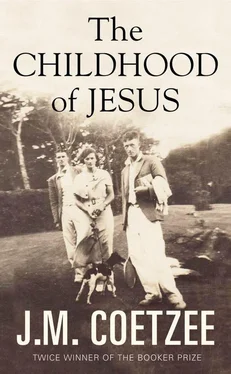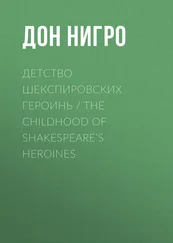The young woman shakes her head. ‘Sorry, I don’t handle keys.’
They make their way back to the Centro de Reubicación. The door is locked. He raps on the glass. There is no sign of life inside. He raps again.
‘I’m thirsty,’ whines the boy.
‘Hang on just a little longer,’ he says. ‘I will look for a tap.’
The girl, Ana, appears around the side of the building. ‘Were you knocking?’ she says. Again he is struck: by her youth, by the health and freshness that radiate from her.
‘Señora Weiss seems to have gone home,’ he says. ‘Is there not something you can do? Do you not have a — what do you call it? — a llave universal to open our room?’
‘ Llave maestra . There is no such thing as a llave universal . If we had a llave universal all our troubles would be over. No, señora Weiss is the only one with a llave maestra for Building C. Do you perhaps have a friend who can put you up for the night? Then you can come back in the morning and speak to señora Weiss.’
‘A friend who can put us up? We arrived on these shores six weeks ago, since when we have been living in a tent in a camp out in the desert. How can you expect us to have friends here who will put us up?’
Ana frowns. ‘Go to the main gate,’ she orders. ‘Wait for me outside the gate. I will see what I can do.’
They pass through the gate, cross the street, and sit down in the shade of a tree. The boy nestles his head on his shoulder. ‘I’m thirsty,’ he complains. ‘When are you going to find a tap?’
‘Hush,’ he says. ‘Listen to the birds.’
They listen to the strange birdsong, feel the strange wind on their skins.
Ana emerges. He stands up and waves. The boy gets to his feet too, arms stiffly by his sides, thumbs clenched in his fists.
‘I’ve brought some water for your son,’ she says. ‘Here, David, drink.’
The child drinks, gives the cup back to her. She puts it in her bag. ‘Was that good?’ she asks.
‘Yes.’
‘Good. Now follow me. It’s quite a walk, but you can look on it as exercise.’
Swiftly she strides along the track across the parkland. An attractive young woman, no denying that, though the clothes she wears hardly become her: a dark, shapeless skirt, a white blouse tight at the throat, flat shoes.
By himself he might be able to keep up with her, but with the child in his arms he cannot. He calls out: ‘Please — not so fast!’ She ignores him. At an ever-increasing distance he follows her across the park, across a street, across a second street.
Before a narrow, plain-looking house she pauses and waits. ‘This is my place,’ she says. She unlocks the front door. ‘Follow me.’
She leads them down a dim corridor, through a back door, down rickety wooden stairs, into a small yard overgrown with grass and weeds, enclosed on two sides by a wooden fence and on the third by chain-link wire.
‘Have a seat,’ she says, indicating a rusty cast-iron chair half covered in grass. ‘I’ll get you something to eat.’
He has no wish to sit. He and the boy wait by the door.
The girl re-emerges bearing a plate and a pitcher. The pitcher holds water. The plate holds four slices of bread spread with margarine. It is exactly what they had for breakfast at the charity station.
‘As a new arrival you are legally required to reside in approved lodgings, or else at the Centre,’ she says. ‘But it will be all right if you spend your first night here. Since I am employed at the Centre, we can argue that my home counts as approved lodging.’
‘That’s very kind of you, very generous,’ he says.
‘There are some leftover building materials in that corner.’ She points. ‘You can make yourself a shelter, if you like. Shall I leave you to it?’
He stares at her, nonplussed. ‘I’m not sure I understand,’ he says. ‘Where exactly will we be spending the night?’
‘Here.’ She indicates the yard. ‘I’ll come back in a while and see how you are getting on.’
The building materials in question are half a dozen sheets of galvanized iron, rusted through in places — old roofing, no doubt — and some odds and ends of timber. Is this a test? Does she really mean that he and the child should sleep out in the open? He waits for her promised return, but she does not come. He tries the back door: it is locked. He knocks; there is no response.
What is going on? Is she behind the curtains, watching to see how he will react?
They are not prisoners. It would be an easy matter to scale the wire fence and make off. Is that what they should do; or should he wait and see what will happen next?
He waits. By the time she reappears the sun is setting.
‘You haven’t done much,’ she remarks, frowning. ‘Here.’ She hands him a bottle of water, a hand towel, a roll of toilet paper; and, when he looks at her questioningly: ‘No one will see you.’
‘I have changed my mind,’ he says. ‘We will go back to the Centre. There must be a public room where we can spend the night.’
‘You can’t do that. The gates at the Centre are closed. They close at six.’
Exasperated, he strides over to the stack of roofing, drags out two sheets, and leans them at an angle against the wooden fence. He does the same with third and fourth sheets, making a rude lean-to. ‘Is that what you have in mind for us?’ he says, turning to her. But she is gone.
‘This is where we are going to sleep tonight,’ he tells the boy. ‘It will be an adventure.’
‘I’m hungry,’ says the boy.
‘You haven’t eaten your bread.’
‘I don’t like bread.’
‘Well, you will have to get used to it, because that is all there is. Tomorrow we will find something better.’
Mistrustfully the boy picks up a slice of bread and nibbles at it. His fingernails, he notices, are black with dirt.
As the last daylight wanes, they settle down in their shelter, he on a bed of weeds, the boy in the crook of his arm. Soon the boy is asleep, his thumb in his mouth. In his own case sleep is slow in coming. He has no coat; in a while the cold begins to seep up into his body; he begins to shiver.
It is not serious, it is only cold, it will not kill you , he says to himself. The night will pass, the sun will rise, the day will come. Only let there not be crawling insects. Crawling insects will be too much.
He is asleep.
In the early hours he wakes up, stiff, aching with cold. Anger wells up in him. Why this pointless misery? He crawls out of the shelter, gropes his way to the back door, and knocks, first discreetly, then more and more loudly.
A window opens above; by moonlight he can faintly make out the girl’s face. ‘Yes?’ she says. ‘Is something wrong?’
‘Everything is wrong,’ he says. ‘It is cold out here. Will you please let us into the house.’
There is a long pause. Then: ‘Wait,’ she says.
He waits. Then: ‘Here,’ says her voice.
An object falls at his feet: a blanket, none too large, folded in four, made of some rough material, smelling of camphor.
‘Why do you treat us like this?’ he calls out. ‘Like dirt?’
The window thuds to.
He crawls back into the shelter, wraps the blanket around himself and the sleeping child.
He is woken by a clamour of birdsong. The boy, still sound asleep, lies turned away from him, his cap under his cheek. His own clothes are damp with dew. He dozes away again. When next he opens his eyes the girl is gazing down on him. ‘Good morning,’ she says. ‘I have brought you some breakfast. I have to leave soon. When you are ready I will let you out.’
‘Let us out?’
‘Let you out through the house. Please be quick. Don’t forget to bring the blanket and the towel.’
Читать дальше












